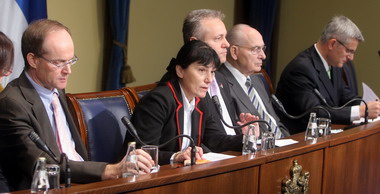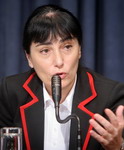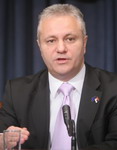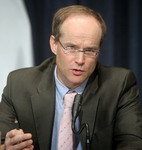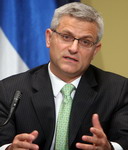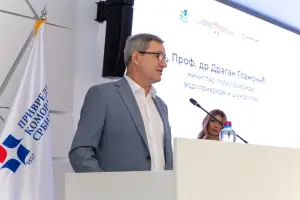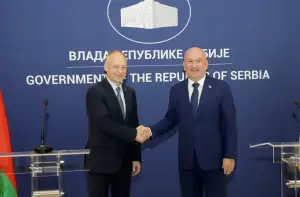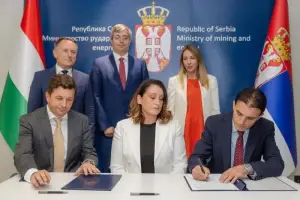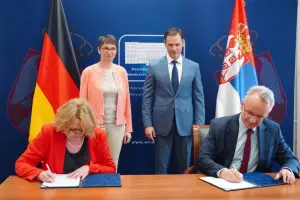Q:
A:
Serbia, IMF successfully complete negotiations
Belgrade,
4 November 2009
Minister of Finance Diana Dragutinovic announced today that the Serbian government has successfully completed negotiations with the International Monetary Fund (IMF).
Dragutinovic said at the press conference said that the government reached an agreement on conditions of further use of credit stand-by arrangements, and added that it was agreed to freeze wages and pensions in 2010.
The Minister said that agreement was reached with the IMF on beginning of pension reform in 2010, whose full effects will not be felt until 2020.
She stressed that the key to the success of negotiations with the IMF was a consensus within the government and perseverance.
The Minister said that agreement was reached with the IMF on beginning of pension reform in 2010, whose full effects will not be felt until 2020.
She stressed that the key to the success of negotiations with the IMF was a consensus within the government and perseverance.
According to Dragutinovic, by reducing current expenditures in the GDP there will be more space for the capital expenditures and fiscal incentives that are necessary in 2010.
Dragutinovic said that agreement was reached that the budget for 2010 will have revenues of approximately RSD 655 billion, expenditures of about RSD 760 billion, while the budget deficit will amount to around RSD 105 billion or 4% of GDP.
The Minister recalled that the public spending in 2008 amounted to 44.5% of GDP, whereas the budget for 2010 will reduce public spending to 41.4% of GDP.
It was announced that the IMF mission will visit Serbia again in February next year and the Serbian government will then pass the law on the budget system and fiscal responsibility, noting that presently they are separate regulations.
The Minister said that the government will cover the budget deficit through borrowing from the domestic financial market and international financial institutions, and added that Serbia has secured sufficient funds to finance the deficit by means that will not cause inflation.
She stressed that the budget will be liquid this and next year and announced that the 2010 budget law will be discussed by the government in two to three weeks’s time.
According to her, Serbia has funds to the amount of €400 million that have not been spent, and it will rely this year and next on borrowing from the domestic financial market by selling short-term securities.
The Minister said that Serbia counts on soft loans from the World Bank, from which $200 million should arrive by the end of the year and $300 million by the end of the next year. Serbia should receive a €50 million grant from the European Union by the end of the year and another €100 million next year, as well as macro financial aid in the amount of €200 million, Dragutinovic specified and recalled that Serbia received €600 million from the IMF on the basis of special drawing rights, which will also go to the budget. She said that the construction of Corridor 10, apart from the northern section that will be financed from the budget, will be covered by project loans of the World Bank, the European Agency for Reconstruction and Development and the European Investment Bank under favourable conditions. Serbia also counts on loans from the Russian Federation, the Minister said and added that negotiations have not been completed and that there are still no concrete numbers. She explained that the Serbian side finds acceptable only those credit conditions that are better that the ones it can get on the domestic financial market.
Dragutinovic said that agreement was reached that the budget for 2010 will have revenues of approximately RSD 655 billion, expenditures of about RSD 760 billion, while the budget deficit will amount to around RSD 105 billion or 4% of GDP.
The Minister recalled that the public spending in 2008 amounted to 44.5% of GDP, whereas the budget for 2010 will reduce public spending to 41.4% of GDP.
It was announced that the IMF mission will visit Serbia again in February next year and the Serbian government will then pass the law on the budget system and fiscal responsibility, noting that presently they are separate regulations.
The Minister said that the government will cover the budget deficit through borrowing from the domestic financial market and international financial institutions, and added that Serbia has secured sufficient funds to finance the deficit by means that will not cause inflation.
She stressed that the budget will be liquid this and next year and announced that the 2010 budget law will be discussed by the government in two to three weeks’s time.
According to her, Serbia has funds to the amount of €400 million that have not been spent, and it will rely this year and next on borrowing from the domestic financial market by selling short-term securities.
The Minister said that Serbia counts on soft loans from the World Bank, from which $200 million should arrive by the end of the year and $300 million by the end of the next year. Serbia should receive a €50 million grant from the European Union by the end of the year and another €100 million next year, as well as macro financial aid in the amount of €200 million, Dragutinovic specified and recalled that Serbia received €600 million from the IMF on the basis of special drawing rights, which will also go to the budget. She said that the construction of Corridor 10, apart from the northern section that will be financed from the budget, will be covered by project loans of the World Bank, the European Agency for Reconstruction and Development and the European Investment Bank under favourable conditions. Serbia also counts on loans from the Russian Federation, the Minister said and added that negotiations have not been completed and that there are still no concrete numbers. She explained that the Serbian side finds acceptable only those credit conditions that are better that the ones it can get on the domestic financial market.
Deputy Prime Minister and Minister of Economy and Regional Development Mladjan Dinkic said that the decline of GDP by the end of the year will amount to 3% as opposed to IMF estimates of 4.5%, adding that its growth in 2010 will exceed 1.5% due to large investments in infrastructure.
Dinkic announced that investments in infrastructure will be increased to €200 million, and economic incentives for €120 million, and stressed that there are five reasons why it is good for Serbia to have reached an agreement with international financial organisations.
He pointed out that the first among them is the reduction of public spending and increasing investment in infrastructure that will next year lead to a higher employment, while another positive reason is that Serbia is able to overcome the economic crisis without raising taxes for both business sector and citizens.
According to Dinkic, the third reason is that in the budget for 2010 is in favour of development, as it will reduce expenditure and public sector wages by approximately €50 million.
Dinkic said that the fourth positive reason is because the age limit for women retiring will not increase from 60 years of age, while the last reason is that Board of Directors of the World Bank will approve $200 million for the Serbian budget on November 17 while the EU macro-financial assistance of €200 million is expected soon.
Dinkic announced that investments in infrastructure will be increased to €200 million, and economic incentives for €120 million, and stressed that there are five reasons why it is good for Serbia to have reached an agreement with international financial organisations.
He pointed out that the first among them is the reduction of public spending and increasing investment in infrastructure that will next year lead to a higher employment, while another positive reason is that Serbia is able to overcome the economic crisis without raising taxes for both business sector and citizens.
According to Dinkic, the third reason is that in the budget for 2010 is in favour of development, as it will reduce expenditure and public sector wages by approximately €50 million.
Dinkic said that the fourth positive reason is because the age limit for women retiring will not increase from 60 years of age, while the last reason is that Board of Directors of the World Bank will approve $200 million for the Serbian budget on November 17 while the EU macro-financial assistance of €200 million is expected soon.
Head of IMF mission Albert Jaeger said that the Serbian government and the IMF achieved a good and balanced agreement, and added that the main challenge for the Serbian authorities will be to the implement that programme.
Jaeger recalled that the agreement should be approved by the Executive Board of the IMF, whose meeting is scheduled for the end of December, and added that the main issues during the talks with the Serbian government were budgets for 2009 and 2010 as well as fiscal policy after 2010.
Given that the government decided to make fiscal adjustment at the expense of current expenditures this means that the fiscal adjustment for this and next year will burden salaries and pensions, Jaeger explained.
Jaeger recalled that the agreement should be approved by the Executive Board of the IMF, whose meeting is scheduled for the end of December, and added that the main issues during the talks with the Serbian government were budgets for 2009 and 2010 as well as fiscal policy after 2010.
Given that the government decided to make fiscal adjustment at the expense of current expenditures this means that the fiscal adjustment for this and next year will burden salaries and pensions, Jaeger explained.

